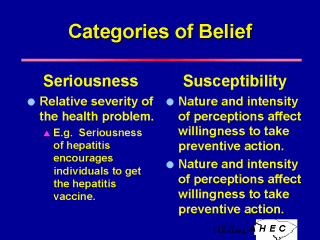 |
Perceived
Seriousness
Perceived seriousness relates to one’s view of the severity of the condition if
they do not practice the preventive behavior. People are more likely to practice health
promotion if they are concerned about a serious disease consequence if they don’t. For
example, AIDS, if they don’t practice safe sex, or hepatitis if they do not get the
hepatitis vaccine.
Perceived Susceptibility
This is “how vulnerable” do I feel related to a specific health problem?
People’s perception of their vulnerability may not match their true risk. Smokers may
feel protected from lung cancer and not personally feel at risk for the disease, for
example. In reality, smokers have a significantly higher risk of developing the disease
than non-smokers.
The Health Belief Model has helped confirm that the more susceptible individuals
feel about a health condition, the more likely they are to take protective action.
Example: Elderly who perceive they will get the flu from frequent exposure will get
the shot. |
